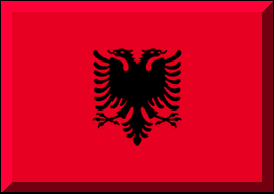
KOSOVO, THE LAND DIVIDED BY HATE

The Gaze of Ulysses a movie
directed by Theo Anghelopulos, resumes with amazing meticulousness the dramatic
situation of East Europe , tightened in the vice of the absolutist regimes, the
dictatorships and the ethnic hates. Lately bloody and fratricide fights took place in the Balkans peninsula. These civil wars, fostered by the nationalistic claims and
the fanaticism of some politicians, as the
Croatian Franjo Tudjman, the Bosnian Alija Izetbegovic, and the Serb Slobodan
Milosevic, hit entire populations, reaching many cities of the former Yugoslavia,
from Vukovar to Pristina , from
Sarajevo to Podgorica.
In 1980 after the death of Josip
Broz, best known as the " marshal Tito ", the fragile equilibrium
between the various groups that constitute the complex Yugoslav ethnic mosaic (four
languages, three religions, two alphabets), collapses definitively under the
blows of the nationalistic propaganda and the independence movements .
First in Slovenia, then in Croatia and Bosnia, the war emphasized, if
someone still wasnt aware , that Titos Yugoslavia was just a fond memory.
On the Balkan powder keg the flower of hate had bloomed and the drama of
the war fomented violence against
everyones neighbours. In the
Balkans, Cain and Abel speak different languages and the terrible law of the
" brother kills brother ", finds a cinematographic realization in the
satirical movie Underground
directed by E. Kusturica.
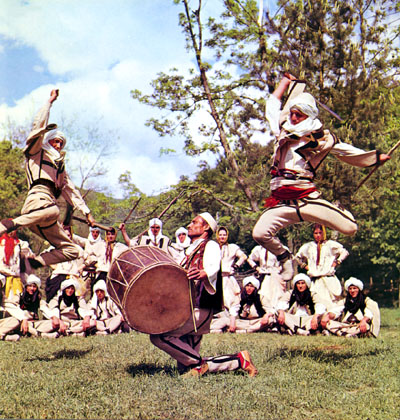
Dance of Kosova Albanians
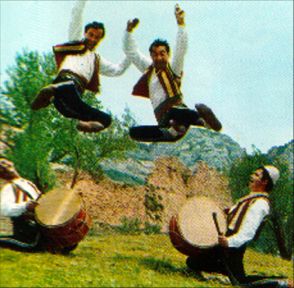
North Albanian dance
In 1980,
Kosovo, that under Tito benefit by a pseudo-self-government status, is fully
aware that the situation is getting
worse. The population, in majority
Albanians, that in this period is facing a deep economic crisis, rises up
against the decision of the federal government to cut the Yugoslavian economical
aids to Kosovo, usually destined to the less developed regions of Yugoslavia. This
protests is ignored, but, in March 1980, the revolt of the Albanian students
fiercely burst out . The first
separatist voices begin to circulate and spark off . In Kosovo starts the "
Albanian spring " but the uprising is put down with great bloodshed by the
Serbian central power. For
approximately 10 years, rage and revenge smoulder
under the violence ashes. The powder keg seems to explode
at any moment and in 1989 a social and racial conflict begins .
Slobodan Milosevic, elected president of
Yugoslavia (which by now includes only Serbia and Montenegro) supporting
the Serbian nationalism, wipes out every autonomy of the Albanians.
The 28 June 1989, Milosevic triumphally enters
in the outpost of Kosovo-Polje (The Blackbirds Field ),a
highly symbolic place for the Serbian pride and famous because in 1389
there took place a battle between Serbs and Turks, during which the king Lazar
Hrebeljanovic died fighting "
for the motherland and the holy Orthodoxy " (even if the historians say
that the Albanian nobleman George II Balsha, prince of Zeta, secretly helped the
Serbian king). In this historically
important place, Milosevic
proclaims between the thunderous applause of the Serbs that " From now on,
nobody will dare to raise his hands on a Serb! ".
Behind such affirmation is hidden the announcement of a
politic based on oppression and racial discrimination, that reaches the
public institutions and even the schools. Initially
it is the non violent party of the " Democratic League of Kosovo " to
collect the hopes of the Albanians. Ibrahim Rugova, the leader of
this political force, fix his primary objective: the creation of an Albanian
parafederal organization equipped with its own sanitary services, schools and
universities. The brutality and the
overbearingness of the Serbian government favour the rebirth of the Albanian
nationalism, which finds a
political and a military expression in the foundation of the UĒK ( Ushtria
Ēlirimtarė e Kosovės, namely the " Kosovo Liberation Army " ).
The guerrillas collect the inheritance of the " KACACK ", the
Albanian resistance that fought against the Serbs during the first World
war.
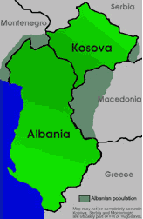
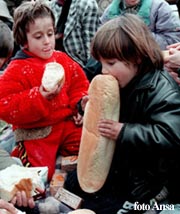
The peace of Dayton in 1995,
disappoints the expectations of the Albanians. Actually the war is just
begun, unfortunately involving the populations: the Albanian citizens,
hit by the atrocious and chilling hatred that lead to Milosevics ethnic
cleansing; but also the Serb
people, subject to Natos airplanes terrible
bombardment . As it has been recently reported, even the armed revolt of the Albanian minority present in
Macedonia is
burst out ( with the same name of UĒK, which this time means
" Ushtria Ēlirimtarė Kombėtarė ", that is " National
Liberation Army "), that
strongly claims equal rights for the Albanian citizens who live in that region.
After the peace accord and the demilitarisation (although not complete) of the
rebellious army , a contingent of international forces has been sent also in
Macedonian, as it had previously happened in Kosovo.
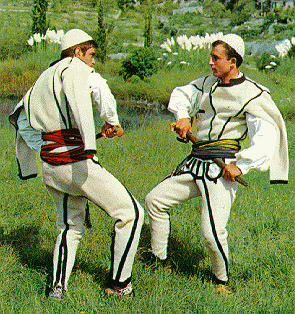
Kosova - Rugova
For the Balkan countries, today
it is time to reconstruct and to find out again the lost equilibriums. The new generations surely represent the hope for a better
future, far away from the extremisms and the racial discriminations.
I would wish all the best to the people of these tormented lands. Getting
along together is based on mutual understanding and I hope that the common will
to recommence can prevail over revenge and hatred.
In memory of Din Mehmeti, albanian poet of Kosovo, brutally assassinated by the Serbian paramilitary troops the 29th March 1999. Before meeting its firing squad, feeling the death approaching, Mehmeti wrote these few lines:
" the flowers of blood
will come be tight, my hut
in memory of all the war victims.
BIBLIOGRAPHY :
MIRANDA VICKERS, BETWEEN SERB AND ALBANIAN: A HISTORY OF KOSOVO, Columbia University Press, 1998.
MIRANDA VICKERS, JAMES PETTIFER, ALBANIA: FROM ANARCHY TO A BALCAN IDENTITY, New York University Press, 1997.
James Pettifer , Blue Guide Albania and Kosovo, First Edition (Blue Guides) .
M. DOGO, KOSOVO. ALBANESI E SERBI : LE RADICI DEL CONFLITTO, Lungro di Cosenza, 1992.
ANTONELLO BIAGINI, MOMENTI DI STORIA BALCANICA ( 1878 - 1914 ), Roma, 1981.
FICTION and POETRY :
SEFEDIN FETHIU, IL TEMPO DEL RISVEGLIO, Ed.Stilo.
ISMAIL KADARÉ, TRE CANTI FUNEBRI PER IL KOSOVO, Longanesi Ed.